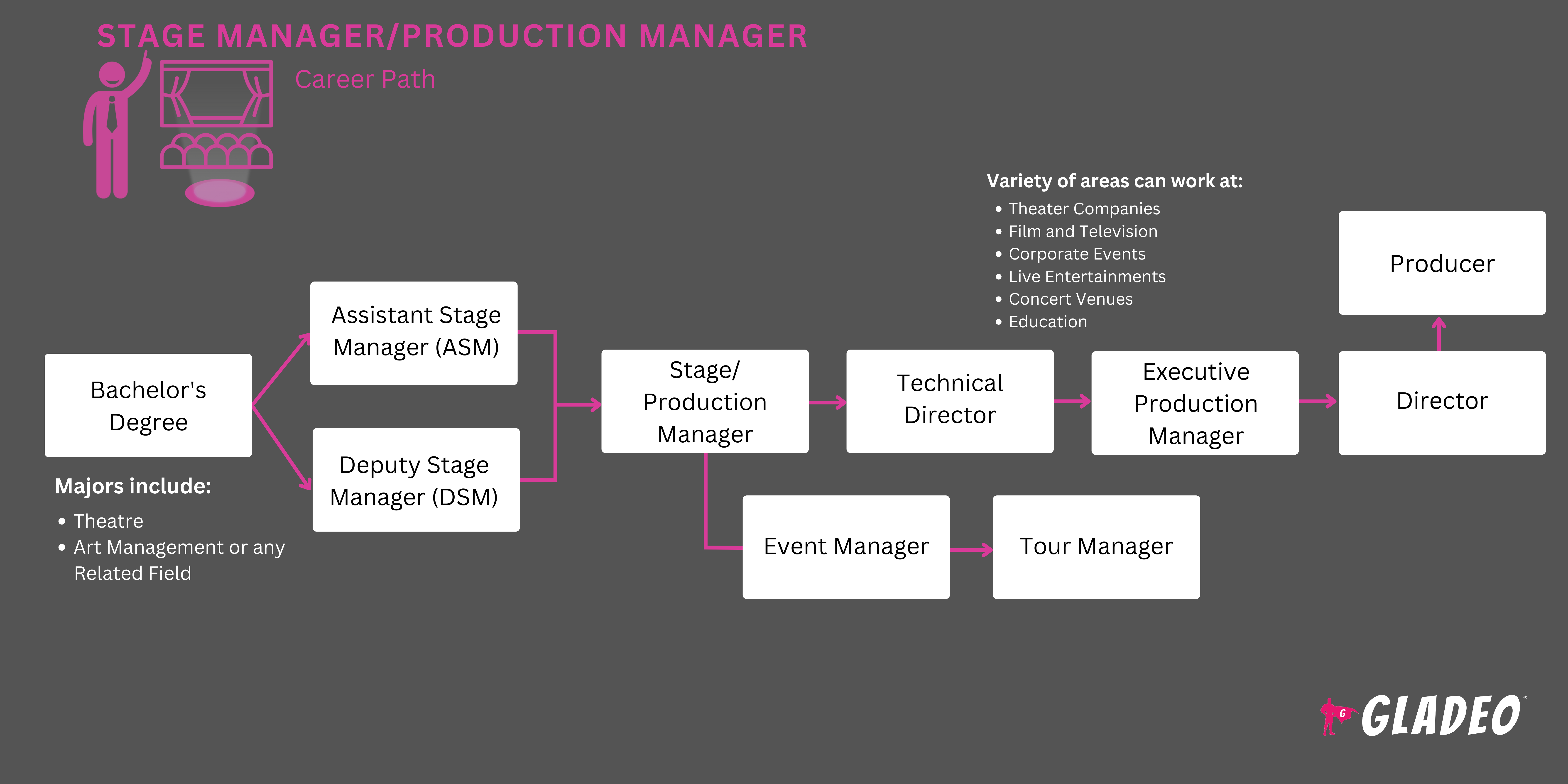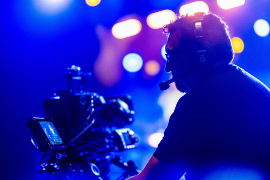聚光灯
技术总监、制作协调员、制作主管、活动经理、制作舞台协调员、演出召集人、制作助理、制作管理员、舞台主管、舞台运营经理、舞台制作人
在戏剧和现场制作的世界里,有两个角色是所有演出成功不可或缺的--舞台监督和制作经理!
舞台监督(SM)是排练和现场表演中的技术关键。他们要确保演员准确无误,协助导演完成技术任务,监督演出的实时性。他们还是演员和工作人员之间的沟通桥梁。
制片经理(PM)主要负责更广泛的制片工作,如预算、日程安排、后勤、聘用设计师以及与技术部门协调。制片经理要确保整个制作 "步调一致",这样演职人员才能将导演的构想变为现实。
现场工作人员和项目管理人员是现场制作不可或缺的一部分,确保演出顺利进行!在某些情况下,他们的角色可能会重叠,甚至合二为一,这取决于演出的规模和范围。
- 在一个快节奏的创意环境中工作
- 帮助保持演员和工作人员的和谐共处
- 确保现场表演继续成为娱乐业的重要组成部分,帮助保持艺术的活力--以及演员和工作人员的就业!
工作日程
- 舞台和制作经理全天工作,晚上和周末也经常工作。在为他们受雇的特定节目工作时,他们要投入大量的加班时间。但一旦演出结束,他们就可能面临停工,必须寻找其他项目来工作。
典型职责
舞台监督(SM)
- 执行制作前任务,如审查工会规则、制作联系表和审查表演空间的尺寸
- 安排并监督排练,确保所有环节顺利进行
- 使用提示脚本,详细记录分镜头(即演员在舞台上的移动位置、灯光和声音提示等),跟踪道具,并与导演合作
- 调用灯光、音响和其他技术方面的提示,使所有元素都能按照排练进行
- 充当导演、演员和工作人员之间的沟通中心
- 传递重要信息;确保每个人都 "站在同一起跑线上"
- 监控表演者和工作人员的安全;进行安全检查
- 协调制作服装、假发和道具
- 进行演出前热身并管理后台活动
- 查看《舞台管理资源》,了解全面的职责清单
生产经理(PM)
- 创建和维护生产预算
- 确保制作在 "财务上可行"
- 安排技术排练;制定布景制作/装卸时间表
- 面试和聘用技术团队成员
- 协调各部门(如灯光、音响、服装和布景)之间的工作
- 应对问题;确保各部门拥有所需的资源
- 管理场地后勤,例如检查布景是否适合场地空间,并与场地工作人员联络
- 在排练和演出期间为舞台监督准备好技术要素
- 为所需时间采购适用设备
舞台监督和制作监督的职责都包括管理和协调。舞台监督主要负责排练和演出。制作经理则负责更广泛的制作元素,确保资源、人员和日程安排协调一致,使制作成为可能。根据制作规模的不同,可能只有一个人同时兼任这两项工作!
额外责任
- 审阅剧本。与导演、演员和工作人员讨论创意和潜在问题
- 确保理解和把握导演的创意构想
- 帮助寻找合适的场地
- 复习预期的技术或后勤困难,例如需要特技协调的物理危险
- 与所有部门保持联系,确保每个人都能协调一致地工作
- 酌情批准布景或舞台设计
- 在制作开始前,对预算和财务因素进行审查。确保制作进度和预算不超支
软技能
- 激励他人的能力
- 积极倾听
- 在压力下保持冷静
- 协作性
- 概念化的技能
- 信心
- 解决冲突的技能
- 创造性
- 果断性
- 注重细节
- 灵活性
- 直观的
- 领导人
- 耐心
- 坚持不懈
- 说服力
- 解决问题的能力
- 强大的沟通能力
- 团队建设
- 视觉和书面故事的讲述
技术技能
舞台监督
- 技术线索脚本分析
- 了解舞台说明和术语;了解提示书、排练技巧和流程
- 掌握提示呼叫技巧
- 熟练使用通信耳麦和传呼系统
- 阅读和解释灯光设计、音响设计和布景设计的能力
- 熟悉各种舞台管理软件(如QLab、Stage Write)
- 熟悉剧院的健康和安全规程;接受过基本的急救培训
生产经理:
- 了解技术车手及其影响
- 能够阅读地面平面图、照明图和技术示意图
- 预算编制和财务跟踪知识
- 熟悉场地规格/要求
- 擅长日程安排和时间表管理
- 了解各种技术学科(灯光、音响、索具等)。
- 了解合同谈判和招聘流程
- 熟悉健康与安全法规,包括风险评估
- 设备采购、租赁和购买方面的知识
- 了解从前期制作到后期制作的制作工作流程
- 剧团
- 百老汇和外百老汇剧目
- 歌剧院
- 音乐会场馆
- 电视演播室
- 电影场景
- 主题公园
- 教育机构(中小学和大学作品)
- 体育赛事
- 颁奖仪式和庆典活动
如果没有舞台监督,每当大幕拉开,现场表演就会陷入混乱!他们的任务错综复杂,需要与制作团队、导演和技术人员进行出色的协调和多任务处理。
现场戏剧(或剧场,如果你愿意)和其他现场活动可能难以预料,但工作人员必须确保每场演出顺利进行。工作时间可能会很长,尤其是在技术周期间,排练和最后一刻的改动会非常多。他们还可能要处理沮丧的演员或技术问题。
大多数演出的场次有限,因此舞台经理可能需要兼顾多个项目,以维持稳定的收入。制作经理也是如此,没有他们,制作就会崩溃!他们的工作涉及复杂的组织和后勤挑战。
项目管理人员深入到前期制作阶段,确保从布景到音响设备等一切都为演出做好准备。同样,部门会议、预算审查、后勤或设备问题也会让工作时间变得漫长。
随着高预算流媒体平台的激增,现场制作和戏剧表演的表现形式也迎来了复兴。精彩的剧本创作、出色的制作设计和丰厚的报酬吸引了许多知名演员,而在早期,他们可能只能从事电影或电视表演。
制片人正在聘用更多的舞台经理和制作经理,以确保演出顺利进行,并在导演的构想与舞台上的实际执行之间架起一座桥梁。
从百老汇到巡回演出、游轮表演和独家现场活动,戏剧演出的质量和数量都在不断提高。随着连锁影院努力拉回观众,现场戏剧的诱惑力似乎越来越大。随着对专业技能的需求越来越大,现场工作人员和项目管理人员在大型节日、企业活动和专门演出中也扮演着举足轻重的角色。
舞台经理和制作经理很可能很早就有现场制作的天赋。学校参与的活动可能包括戏剧或活动协调。他们往往在团体任务或学校活动中成为可靠、勤勉的领导者,显示出他们能够兼顾多项任务并监督更广泛的项目。
他们中的大多数人都表现出精确性和实用性的融合,在需要沟通和多任务处理的岗位上表现出色。他们可能是好奇的学习者,既有创造性,又善于处理后勤工作和小细节!
- 舞台和制作经理至少需要高中文凭。不一定要有大学学位,但有些人会获得戏剧、戏曲或舞台管理方面的学士学位,或者通过社区学院课程接受正规培训。
- 大多数工人从初级职位做起,如舞台工作人员、技术人员或制作助理,然后在当地制作中积累经验,晋升为舞台或制作经理助理。
- 各种制作类型的实践经验都很有用,例如戏剧、音乐剧和现场音乐会活动的工作经验
- 大学和实际工作经验对于在行业内建立人际网络和人脉关系也至关重要,这对你的职业发展非常宝贵
- 考虑学费、折扣和当地奖学金的机会(除联邦援助外)。
- 在决定是否参加校内、网上或混合课程时,要考虑你的时间安排和灵活性。理想情况下,你会希望得到尽可能多的实践练习。
- 查看本专业教师获得的奖项和成就,了解他们参与制作的作品
- 仔细观察学校的设施以及学生训练的设备和软件
- 查看就业安置统计资料和该项目校友网络的详细信息
- 储备艺术、英语、交流、演讲、心理学、设计和摄影方面的课程
- 志愿参加学校活动,你可以学习如何有效地作为一个团队工作,练习领导技能,并管理大型项目
- 考虑报名参加自信心和应变能力课程,以便在压力环境下指挥团队
- 参加视听和戏剧俱乐部,获得实践经验
- 参加学校和地方剧院的演出,以及音乐会和其他公共活动。做志愿者或寻找兼职工作
- 试着决定你更愿意成为舞台经理还是制作经理,这样你就可以调整你的学习和工作活动,使之朝着这个方向发展
- 学习书籍、文章、在线论坛、视频教程和幕后纪录片(参见我们的 "资源">"网站 "列表)
- 了解每个主要相关部门的来龙去脉,如布景设计和搭建、服装设计、灯光和音响、道具、化妆和发型、舞蹈编排、音乐、特效团队等。
- 了解一些顶级舞台经理和制作经理。阅读他们的简历,寻找灵感和创意
- 询问在职的 SM 或 PM 是否有时间与你进行一次信息访谈,或者使用 "询问舞台经理"!
- 推出在线作品集,展示你的技能和作品
- 经常参加本地演出。尽量获得年票或学生折扣
- 加入所在地区与戏剧相关的专业组织,了解发展趋势,拓展人际网络

- 查看百老汇世界等剧院招聘网站以及Indeed、Simply Hired 和Glassdoor等招聘门户网站
- 您需要申请初级职位,然后逐步晋升为舞台助理和制作经理。
- 许多 SM 和 PM 从助理或实习生做起
- 在 Craigslist 上寻找当地小型制作公司的初级职位
- 让当地的剧院公司知道你正在寻找工作或实习机会!根据CNBC 的报道,"研究表明,70% 的工作都没有在招聘网站上公开发布,多达 80% 的工作都是通过个人和专业关系找到的"。
- 在申请带薪职位之前,尽可能多地积累学校和志愿者工作的经验
- 在符合条件时加入舞台经理协会或其他专业组织
- 考虑搬到戏剧演出(因此也可能是工作机会)最多的地方,如纽约、芝加哥、波士顿、亚特兰大、丹佛、西雅图、明尼阿波利斯、华盛顿特区、新奥尔良、费城、休斯顿、洛杉矶和旧金山。
- 跳上Quora,开始询问工作建议问题,并请求在职 SM 和 PM 解答。
- 询问你的教授、主管和同行是否愿意作为个人推荐人
- 与你学院的就业中心交谈,以获得简历、模拟面试和求职方面的帮助。
- 查看舞台经理简历模板,了解格式和措辞方面的想法
- 查找常见面试问题,为关键面试做好准备
- 要想面试成功,着装一定要得体!
网站
- 演员权益协会
- 美国音乐艺术家协会
- 美国综艺艺术家协会
- 百老汇世界
- 美国导演协会
- 教育戏剧协会
- 走进剧院
- IASTE
- 生产经理论坛
- SAG-AFTRA
- 舞台杂志
- 舞台经理资源
- 舞台经理协会
- 剧院传播集团
- 剧院发展基金
- 美国技术戏剧学院
书籍
- 舞台管理基础:舞台管理基础:表演艺术舞台经理入门》,艾米丽-罗斯、乔纳森-阿伦德-齐维克等著。
- 舞台监督:拉里-法齐奥著《重温职业经验
- 制作经理工具包》,作者:Cary Gillett 和 Jay Sheehan
- 舞台经理工具包:劳里-金克曼(Laurie Kincman)著:《舞台经理工具包:指导戏剧制作的模板和沟通技巧》(Templates and Communication Techniques to Guide Your Theatre Production from First Meeting to Final Performance)。
舞台经理或制作经理并不像有些人想象的那样光鲜亮丽。它的工作要求很高,极其注重细节,工作时间很长。
精力充沛的人如果能将领导能力、技术诀窍和组织技能完美结合,就能在这一行业声名鹊起。但是,如果您对一些相关职业感到好奇,可以考虑以下选择!
- 演员
- 艺术总监
- 广播、音响和视频技术员
- 编舞家
- 时尚设计师
- 电影和视频剪辑师和摄像师
- 平面设计师
- 摄影师
- 制片人和导演
- 特效艺术家和动画师
- 作家和作者
新闻联播

特色工作

在线课程和工具









